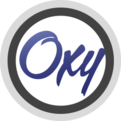 | |
| Paradigm | object-oriented |
|---|---|
| Developer | RemObjects Software |
| First appeared | 2005[1] |
| Platform | Common Language Infrastructure, Java, Cocoa, CPU-Native, Windows 32/64 bit, Linux 32/64 bit, WebAssembly |
| License | Trialware |
| Website | elementscompiler |
| Influenced by | |
| Delphi's Object Pascal, C# | |
Oxygene (formerly known as Chrome) is a programming language developed by RemObjects Software for Microsoft's Common Language Infrastructure, the Java Platform and Cocoa. Oxygene is based on Delphi's Object Pascal, but also has influences from C#, Eiffel, Java, F# and other languages.
Compared to the now deprecated Delphi.NET, Oxygene does not emphasize total backward compatibility, but is designed to be a "reinvention" of the language, be a good citizen on the managed development platforms, and leverage all the features and technologies provided by the .NET and Java runtimes.
Oxygene is a commercial product and offers full integration into Microsoft's Visual Studio IDE on Windows, and its own IDE called Fire for use on macOS. Oxygene is one of six languages supported by the underlying Elements Compiler toolchain, next to C#, Swift, Java, Go and Mercury (based on Visual Basic (.NET)).
From 2008 to 2012, RemObjects Software licensed its compiler and IDE technology to Embarcadero to be used as the backend compiler in their Embarcadero Prism product.[2] Starting in the Fall of 2011, Oxygene became available in two separate editions, with the second edition adding support for the Java and Android runtimes. Starting with the release of XE4, Embarcadero Prism is no longer part of the RAD Studio SKU. Numerous support and upgrade paths for Prism customers exist to migrate to Oxygene.[3] As of 2016, there is only one edition of Oxygene, which allows development on Windows or macOS, and which can create executables for Windows, Linux, WebAssembly .NET, iOS, Android, Java and macOS.
- ^ "Evolution of the Oxygene Language | Oxygene | Elements". Archived from the original on 2018-01-05. Retrieved 2018-01-04.
- ^ "Embarcadero Prism page, at the bottom of the page an image stating it is powered by RemObjects Oxygene". Archived from the original on 2011-12-27. Retrieved 2011-12-14.
- ^ "Prism XE4, Where Art Thou? | RemObjects Blogs". Archived from the original on 2013-06-20. Retrieved 2013-06-06.